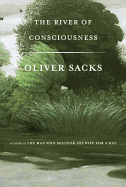
Two weeks before his death in 2015, author and neurologist Oliver Sacks (On the Move) arranged for the publication of his essay collection The River of Consciousness. Sacks was one of the finest science writers--well read, scientifically exact and literary.
The essays cover topics that include the sentience of worms and plants, the senses of speed and time, Darwin's extensive botanical writings, Freud's early work in neurology and anatomy, and how scientific progress is hampered by cultural expectations and fashions in ideas. The title essay considers the scientific evidence for "the idea that consciousness is composed of discrete moments" just as a film is composed of individual frames. "The Fallibility of Memory" deals with the phenomena of false memories, unconscious plagiarism and mistaken eyewitness testimonies, and how forgetting can allow for creativity, permitting us to "assimilate what we read, what we are told, what others say and think and write and paint, as intensely and richly as if they were primary experiences.... Memory is dialogic and arises not only from experience but from the intercourse of many minds."
Sacks's love of the natural world as well as the human one is contagious. The breadth of his interests encourages his readers to expand their own horizons. "I rejoice in the knowledge of my biological uniqueness and my biological antiquity and my biological kinship with all other forms of life. This knowledge roots me, allows me to feel at home in the natural world, to feel that I have my own sense of cultural meaning, whatever my role in the cultural, human world." His curiosity and erudition, and his joy in both intellectual and physical life are in full bloom on these pages. --Sara Catterall

